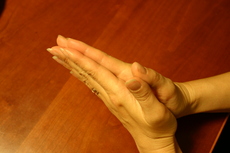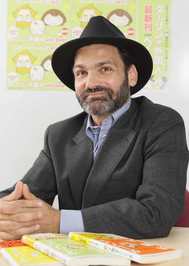
その壱 翻訳なんてするもんか
トニー・ラズロ
言語研究家
「自分で自分の代理をけっしてするな」、という旨の諺がある(法廷での話)。
実は、これを日本語にどう訳したらいいか、迷っている。原文は「He who acts as his own attorney has a fool for a client」だけれど、ご覧のとおり、「Don't」という言葉は一つもない。だから、厳密に言えばこの諺は「自分の弁護をするな」ではなく「そうする人はバカである」、と言っているのだ。たぶん、「自分の弁護を している人は、愚かな依頼者の弁護をしているのである」、が直訳に近いだろう。でも、これは「弁護」を二回繰り返しており、回りくどい気がする。やはり、「するな」という最初のバージョンのほうがいいかな?... なかなか決められないなあ、これ。
正直に言えば、訳語を決められないのは何も今回に限った話ではない。いつものことだ。机に向かっ て、翻訳をしだしても、すぐに立ち止まってしまう。そ してフラストレーションがたまり、まったく進まな くなる。どうしてかはよくわからない。もしかすると、翻訳は「これ」という一つの正解がないからではないか。しかし、これ自体が問題で はないだろう。長時間かけ、表現を慎重に選び、選んだ 後また書き直すというような作業は、文筆の仕事も同じだからだ。私がライターである以上、悩み上手なはず。
 いや、翻訳が難しいのは、たぶん、逃げ場がないからだろうと思う。例えば、日本映画に英語字幕を付けろと誰かに命じられたとしよう。そして、 そのワンシーンの中に、「いただきます」という台 詞が出てきたとする。食事前に言う、あの一言。これにぴったり合う英語はない。さあ、どうする? 「Bon appétit!」が訳語候補として浮かんでくる。確 かに、同じくらいのタイミングで発される言葉だし、似た役割を果たしていると言えなくもない。しかし、 これは相手に対して言う挨拶だ。しかも、「たっぷり召し上がれ」という意味。つまり、「さあ、どうぞ」と言っているわけで、「いただきます」とはずいぶん開きがある。やはり、「Bon appétit!」は止めよう。
いや、翻訳が難しいのは、たぶん、逃げ場がないからだろうと思う。例えば、日本映画に英語字幕を付けろと誰かに命じられたとしよう。そして、 そのワンシーンの中に、「いただきます」という台 詞が出てきたとする。食事前に言う、あの一言。これにぴったり合う英語はない。さあ、どうする? 「Bon appétit!」が訳語候補として浮かんでくる。確 かに、同じくらいのタイミングで発される言葉だし、似た役割を果たしていると言えなくもない。しかし、 これは相手に対して言う挨拶だ。しかも、「たっぷり召し上がれ」という意味。つまり、「さあ、どうぞ」と言っているわけで、「いただきます」とはずいぶん開きがある。やはり、「Bon appétit!」は止めよう。
でも、これ以外に道があるかと言えば、そうはない。原文のニュアンスを重視した訳に してみるとしようか。これは一見、良さそうな手だけれど、結局はうまくいかないだろう。まず、文章の 長さ。この文を「私が今から感謝を込めて食べます」と訳すとする。このくらいでも観客が読みきれない場合もある。また、読めても疲れてしまうから、一般論として長い字幕を避けなくてはならない、と いうことになっている。しかもこの場合、俳優の口は「いただきます」と6文字分しか動いていない。そのミスマッチは観客に違和感を覚えさせるに決まっている。そして、そもそも、英語では、 このような習慣がないのも、忘れてはならない。普通は言わないのに、字幕でそう言わせると、観客が抱く違和感がなお大きいものになるだろう。さあ、困った。英語の習慣を意識してもだ めで、「原文のニュアンスに忠実」という路線もうまくいかない。はっきり言えば、良い訳がない。「少ない」とか「あまりない」のではなく、「ない」。
そこで、やけのやん八になって、あえて訳さないこ とに。由緒あるこの方法を、実は私はよく使う。でも、やりすぎてはならない。翻訳の依頼主がこれを許してくれても、誰かから突っ込まれるときがくる。例えば、「ひどい翻訳だ。誰がやったんだ、これ?」と、人のブログで書かれるとか。例えばの話。
ええ、翻訳は逃げ場がないのだ。だから、私はもう足を洗った。翻訳はけっして、しない。それで、もし......やることになったとしても、読者・観客が 訳文と原文の両方を見比べられるような形になってはならない。これを絶対条件とする。そして、もし、誰かに何かの弱みを握られたりして、バイリン ガル版に携わることになっても、その原文と訳文の両方 を自分では担当しない。これだけは譲らないぞ。自分の文を自分で翻訳するような人は、愚か者なんだから。
文 ・ 翻訳: トニー・ラズロ

I'm having trouble translating a proverb. In English, it goes like this: "He who acts as his own attorney has a fool for a client." Now, here's the question. Should I render this literally, using one of the many Japanese words for "idiot"? Or is it better to try to convey the gist of it, which is: "Never represent yourself in court". I really can't decide, and it's driving me nuts.
Come to think of it, this is nothing new. Whenever I sit down to translate something I get stuck and begin gazing into space within the first few minutes. What gives? Am I simply not cut out for this kind of work? As a writer, I'm always mulling over words, so that can't be the problem. No, I think what makes translation really tough is the lack of wiggle room.
For example, suppose you had to create the English subtitles for a Japanese film. And let's say that at one point in the movie, one of the characters says, "itadakimasu" and then starts to eat his dinner. That expression means something like "I thankfully partake of this meal", in this context, but how to render it properly into English? "Bon appétit!" comes to mind - even though it is a loan from French -- as that is something that one says before a meal. But when you say this, you're essentially encouraging another party to, "eat with gusto". So, the two phrases are hardly comparable. Hmm...
Okay, if not "Bon appétit!", how about a literal translation? Ah, but that's not a good idea, either. First of all, length is a problem. As a general rule, subtitles should be kept short so as not to wear out movie-viewers -- they're in the cinema to watch a film, not to read reams of text. Plus, it wouldn't fit the scene, in this case. "Itadakimasu" is just a few syllables. "I thankfully partake of this meal" takes forever to say. Well, maybe not forever. But I'd say there's one more reason to steer clear of this monstrosity: it's not something that a English speaker would say before eating. Such an utterance might very well strike the movie-viewer as somewhat unnatural, if not downright odd.
So, what to do? It seems that there is no good solution. In such a situation, skirting the problem might sound like a way out. That's right, just skipping over it. I must admit, I have done this a number of times over my career, when I thought I could get away with it. It's not something you want to do often, though. Because even if editors and publishers forgive, rarely can you pull the wool over the readers' eyes. "Who on earth did this lousy translation," one of them might write. On a blog. For instance.
And that's what I mean. It's this lack of wiggle room that's the killer. That's why I'll have nothing more to do with translation. I've washed my hands of it, I have. (or "my feet", for the Japanese side of things). If someone asks me to do a translation -- anything at all - my answer will be, "Absolutely not!".
And if said person talks me into doing it, anyway? Ha! I'll make it clear that the reader will certainly NOT have access to both the original document and the translation. I'll definitely put my foot down there. After all, it's only... Hmm? If -- somehow -- I get talked into being involved in such a bilingual project? Well, never, ever will I write a piece in Japanese and then do the English, too. That I can tell you. THAT would be pure folly. For as everyone knows: "Only a fool acts as his own translator".
Text, Translation: Tony László
言語研究家 ハンガリーとイタリアの血を受け継ぎアメリカで育つ。1985年来日。 85年より日本を拠点としてライター活動を開始。92年から多文化共生を研究するNGO「一緒企画(ISSHO)」を運営。 漫画家、小栗左多里の夫であり、「ダーリンは外国人」のダーリン。 自他ともに認める語学オタク。現在一児の父。著書に「トニー流幸せを栽培する方法」、「ダーリンの頭ン中」「イタリアで大の字―さおり&トニーの冒険紀行」「ダーリンは外国人 with BABY」などがある。
※このエッセイは3/10(水)に書きました。東日本大地震において、被害に遭われた皆様に心よりのお見舞いを申し上げます。



